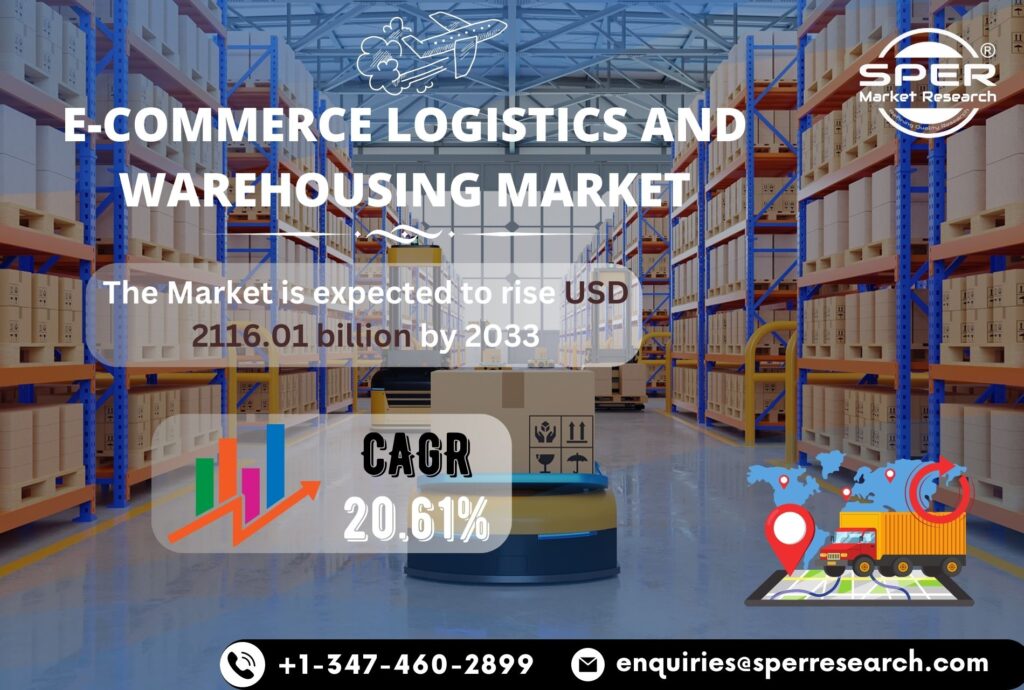E-Commerce Logistics and Warehousing Market Growth and Share 2023, Emerging Trends, Top 10 Key Players, Revenue, Opportunities and Future Scope 2032: SPER Market Research

E-commerce logistics and warehousing are key components of the present online retail economy. E-commerce logistics is the management and coordination of the whole supply chain process involved in the delivery of products to online customers. This technique includes order fulfillment, inventory management, packaging, and shipping. Efficient e-commerce logistics are essential for ensuring on-time and accurate delivery, which has a substantial impact on consumer satisfaction and company reputation.
Warehousing is essential in e-commerce logistics because it serves as a storage hub for the wide range of products sold by online retailers. To save travel time and shipping costs, warehouses are strategically located near important markets.
According to SPER market research, ‘Global E-Commerce Logistics and Warehousing Market Size-By Service Type, By Vertical, By Operation Area, By Type, By Model – Regional Outlook, Competitive Strategies and Segment Forecast to 2032’ state that the Global E-Commerce Logistics and Warehousing Market is predicted to reach USD 2116.01 billion by 2032 with a CAGR of 20.61%.
The e-commerce logistics and warehousing market offers a number of drivers for businesses and investors.
As e-commerce becomes more global, more online retailers are outsourcing their fulfillment operations to third-party logistics (3PL) companies. Offering efficient and dependable fulfillment services such as order processing, picking, packing, and shipping has a tremendous market potential. 3PL organizations may tailor their services to match the specific needs of distinct e-commerce businesses, allowing retailers to focus on core competencies while using the expertise of specialist logistics partners.
The e-commerce logistics and storage industry faces a number of difficulties that affect operational efficiency and profitability.
E-commerce businesses must strike a delicate balance between having enough inventory on hand to meet customer demand and eliminating excess stock, which can tie up funds and increase storage expenses. Forecasting demand is challenging due to continually changing business trends, seasonal fluctuations, and unpredictable client behavior. Effective inventory management systems and data-driven analytics are needed to handle these issues and ensure seamless supply chain operations.
Request For Free Sample Report @ https://www.sperresearch.com/report-store/ecommerce-logistics-and-warehousing-market.aspx?sample=1
The COVID-19 epidemic had a significant impact on the global e-commerce logistics and warehousing industry. When the world suffered widespread lockdowns and constraints, consumer behavior changed dramatically, resulting in a rise in internet purchasing. Demand for e-commerce businesses has skyrocketed, putting great strain on logistics and warehousing operations. Fulfillment centers and warehouses must move quickly to deal with the sudden influx of orders while keeping their staff safe.
Geographically, the regional analysis of the global e-commerce logistics and warehousing business indicates regional differences in market dynamics, infrastructure, and consumer behavior. North America and Europe are mature markets with well-developed e-commerce sectors and sophisticated logistics and warehousing infrastructure. Significant investments in automation and technology adoption have occurred in these regions in order to improve productivity and meet client needs. Additionally, some of the market key players are Exo Logistics Plc, Inc., FedEx Corporation, Gati Limited, K.S.C.P. Agility Public Warehousing.
For More Information, refer to below link:-
E-Commerce Logistics and Warehousing Market Research Report
Related Reports:
Thailand Logistics and Warehousing Market Size-By Function, By End User- Regional Outlook, Competitive Strategies and Segment Forecast to 2032
Qatar Logistics and Warehousing Market Size- By Business Model, By Type of Storage, By Contract Type, By End User, By Courier, Express and Parcel Market, By Delivery Time, By Mode of Payment, By Location of Orders, By Third Party Logistics- Regional Outlook, Competitive Strategies and Segment Forecast to 2032
Follow Us –
LinkedIn | Instagram | Facebook | Twitter
Contact Us:
Sara Lopes, Business Consultant – U.S.A.
SPER Market Research
+1-347-460-2899





